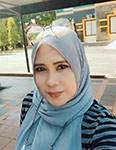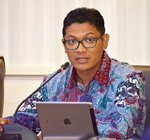Akuatikisle: Jurnal Akuakultur, Pesisir dan Pulau-Pulau Kecil
Full Length Article
Analysis of the leading fisheries sector in the minapolitan area of Pangkep Regency, South Sulawesi Province
Highlights
Generate NLP AI by Wizdam ID.
Abstract
The purpose of this study was to determine the existing condition of the minapolitan area in Pangkep district and to determine the leading sector of capture fisheries and aquaculture commodities in the minapolitan area of Pangkep District, South Sulawesi Province. Data collection techniques were carried out using observation, interviews using questionnaires and documentation. The type of data collected is primary data, namely observation data regarding facilities supporting fishery activities in the Minapolitan area, interview data for respondents from fisheries business actors or fisheries households regarding fishery activities and demographics, then secondary data from agencies related to the production of fishery commodities in Pangkep Regency. And South Sulawesi. This research was conducted in the minapolitan area of Pangkep Regency, South Sulawesi Province, in February – April 2021. The results showed that the existing condition in the availability of infrastructure facilities in the minapolitan area in the mainland area of Pangkep Regency, especially at the level of availability of facilities, was categorized as medium. Supporting facilities for fishery activities are at an availability level of 61.6 per cent because many are abandoned due to not being able to optimize their operations. The leading fishery commodities in the Minapolitan area that have the export potential are Tilapia, Patin, Cottonii seaweed and Milkfish. Fishery commodities that have the potential to meet local market demand are Vanamei Shrimp and Windu Shrimp. Fishery commodities that are not superior are Gracillaria Seaweed, Carp, Catfish and Crayfish.
Keywords
Introduction
Section snippets
Material and Methods
Materials and methods from the full-text PDF of this article cannot be displayed.
Results
Results from the full-text PDF of this article cannot be displayed.
Discussion
Discussion from the full-text PDF of this article cannot be displayed.
Conclusions
Conclusions from the full-text PDF of this article cannot be displayed.
Acknowledgment
Acknowledgment from the full-text PDF of this article cannot be displayed.
Funding Information
Kementerian Pendidikan, Kebudayaan, Riset dan Teknologi Republik Indonesia
Competing interest
The authors declare that they have no known competing financial interests or personal relationships that could have appeared to influence the work reported in this paper.
Conflict of interest
The authors declare that the research was conducted in the absence of any commercial or financial relationships that could be construed as a potential conflict of interest.
Ethical approval acknowledgements
No ethical approval required for this article. All procedures followed were in accordance with the ethical standards of the responsible committee on human experimentation (institutional and national) and with the Helsinki Declaration of 1975, as revised in 2008 (5)
Supplementary files
Data sharing not applicable to this article as no datasets were generated or analysed during the current study, and/or contains supplementary material, which is available to authorized users.
References (1)
Amir, A., Sajriawati., Massiseng, A.N.A., & Lawi, Y.S.A. 2019. Strategi Peningkatan Kompetensi Sumberdaya Manusia Terhadap Good Manufacturing Practice (GMP) Pada Kelompok Pengolah Hasil Perikanan di Kota Makassar. Musamus Fisheries And Marine Journal, 2(1): 35-47.
Akliyah L S, Asyiawati Y, & Putri S E. 2014. Identifikasi Komoditas Unggulan Perikanan Tangkap di Kawasan Minapolitan Kabupaten Indramayu. Prosiding SNaPP2014 Sains, Teknologi dan Kesehatan. ISSN 2303-2480.
Arnawa I K, Udayana I G B, Martiningsih G A G B, & Sukerta I M. 2017. Development Concept Plan of Minapolitan Regions In Gianyar Bali. International Research Journal of Engineering, IT & Scientific Research, 3(6): 11 – 20
Arsyad, Lincolin. 2017. Pengantar Perencanaan Ekonomi Daerah (edisi kedua) BPFE, Yogyakarta
Dwi, Putra E. 2011. Potensi Pengembangan Kawasan Minapolitan di Kecamatan Labakkang Kabupaten Pangkep. Fakultas Sains dan Teknologi Universitas Islam Negeri Alauddin. Makassar.
Fatmawaty, D., Ikawati, & Amri, E. 2018. Strategi Pengembangan Kawasan Minapolitan di Kecamatan Pamboang Kabupaten Majene Dalam Konsep Pengembangan Wilayah. Jurnal Plano Madani, 7(1): 37-45.
Irnawati, Ririn., D Simbolon, B Wiryawan, B Murdiyanto, & T W Nurani. 2011. Analisis Komoditas Unggulan Perikanan Tangkap Di Taman Nasional Karimunjawa. Jurnal Saintek Perikanan. 7(1): 1 – 9.
Jamilah, & Mawardati. 2019. Hubungan Tingkat Kemiskinan Dengan Pemanfaatan Sumber Daya Perikanan Tangkap Pada Kawasan Minapolitan. Jurnal Ekonomi Pertanian dan Agribisnis (JEPA). Vol. 3 No. 2. Hal. 336-347.
Kuncoro, Mudrajat. 2004. Otonomi dan Pembangunan Daerah. Erlangga. Jakarta
Massiseng, A.N.A. & Ummung, A. 2018. Analisis Sektor Unggulan Berdasarkan Potensi Wilayah di Kabupaten Bantaeng Sulawesi Selatan. Jurnal Octopus, 7(1): 709-717.
Nugraha G, Dewi I K, & Sunaryadi A. 2017. Identifikasi Potensi dan Kendala Kawasan Minapolitan Pelabuhan Ratu. Jurnal Prodi Perencanaan Wilayah dan Kota, 2(2): .
Ridwan M, Kasmi M, & Putri A R S. 2018. Penentuan Komoditas Unggulan Perikanan Laut Kabupaten Polewali Mandar Berdasarkan Data Statistik Tahun 2016. Jurnal IPTEKS PSP, 5(10): 98-105.
Riefsa. 2014. Potensi Kelautan Indonesia Bagi Kesejahteraan. Surakarta: CV. Aryheaeko Sinergi Persada.
Rosana N, & Prasita V D. 2015. Potensi dan Tingkat Pemanfaatan Ikan Sebagai Dasar Pengembangan Sektor Perikanan di Selatan Jawa Timur. Jurnal Kelautan, 8(2): 71 – 78.
Suman A, Irlanto H E, Satria F, & Amri K. 2016. Potensi dan Tingkat Pemanfaatan Sumber Daya Ikan di Wilayah Pengelolaan Perikanan Negara Republik Indonesia (WPP NRI) Tahun 2015 Serta Opsi Pengelolaannya. Jurnal Kebijakan Perikanan Indonesia (JKPI), 8(2): 97 – 110.
Suryadi, A.M. & Sufi. 2019. Strategi Pemberdayaan Masyarakat Nelayan Dalam Peningkatan Kesejahteraan Nelayan (Studi di Kantor Camat Muara Batu Kabupaten Aceh Utara). Jurnal Negotium, 2(2): 118-140.
Surya, B., Salim, A., Suriani, S., Menne, F., Rasyidi, S., & Emil. 2021. Economic Growth and Development of a Minapolitan Area Based on Utilization of Renewable Energy, Takalar Regency, South Sulawesi, Indonesia. International Journal of Energy Economics and Policy. 11(5): 255-274.
Susilo, E., Purwanti, P., Fattah, M., & Qurrata, V.A. 2021. Adaptive coping strategies towards seasonal change impacts: Indonesian small-scale fisherman household. Heliyon Journal, 7: 1-12.
Trinyanti R & Firdaus M. 2016. Tingkat Kesejahteraan Nelayan Skala Keci Dengan Pendekatan Penghidupan Berkelanjutan di Kabupaten Indramayu. Jurnal Sosek KP, 11(1): 29 – 43.
Tumangkeng S. 2018. Analisis Potensi Ekonomi di Sektor dan Sub Sektor Pertanian, Kehutanan dan Perikanan Kota Tomohon. Jurnal Berkala Ilmiah Efisiensi, 18(1): 127–138
Wibowo A B, Anggoro S, & Yulianto B. 2015. Status Keberlanjutan Dimensi Ekologi Dalam Pengembangan Kawasan Minapolitan Berkelanjutan Berbasis Perikanan Budidaya Air Tawar di Kabupaten Magelang, Journal of Fisheries Sciences and Technology (IJFST), 10(2): 107-113.
Wijayanti, L & Ihsannudin. 2013. Strategi Peningkatan Kesejahteraan Masyarakat Nelayan Kecamatan Pademawu Kabupaten Pamekasan. Jurnal Agriekonomika, 2(2): 139-152.
Bibliographic Information
Cite this article as:
-
Submitted
26 January 2022 -
Revised
16 February 2022 -
Accepted
22 February 2022 -
Published
27 February 2022 -
Version of record
29 May 2022 -
Issue date
1 May 2022
-
Academic subject
Sosial Ekonomi Perikanan
Copyright
Sangia Advertisement
Copyright © 2022 Malik, Rosnida, Andi Nur Apung Massiseng. Sangia Research Media and Publishing. Production and hosting by Sangia (SRM™).  This work is licensed under a Creative Commons Attribution-ShareAlike 4.0 International License.
This work is licensed under a Creative Commons Attribution-ShareAlike 4.0 International License.
Disclaimer: All claims expressed in this article are solely those of the authors and do not necessarily represent those of their affiliated organizations, or those of the publisher, the editors and the reviewers. Any product that may be evaluated in this article or claim that may be made by its manufacturer is not guaranteed or endorsed by the publisher.
Comments on this article
By submitting a comment you agree to abide by our Terms and Community Guidelines. If you find something abusive or that does not comply with our terms or guidelines please flag it as inappropriate.










